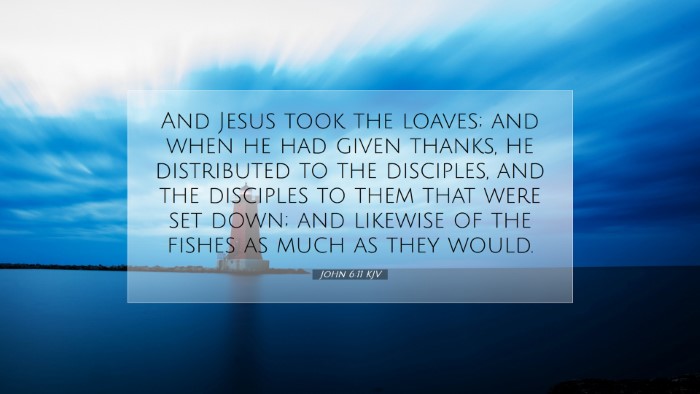Commentary on John 6:11
John 6:11 states: "And Jesus took the loaves, and when He had given thanks, He distributed to the disciples, and the disciples to them that were set down; and likewise of the fishes as much as they would."
Introduction
This verse occurs within the context of the feeding of the five thousand, a miraculous event that highlights both the compassion of Christ and His divine authority. The insights drawn from reputable public domain commentaries such as those from Matthew Henry, Albert Barnes, and Adam Clarke will provide a layered understanding of its significance in the life of Jesus and its implications for believers today.
Exposition
The actions of Jesus in this passage reflect His role as both provider and sustainer, illustrating the relationship between the divine and the physical needs of humanity.
1. The Act of Distribution
Henry emphasizes that when Jesus "took the loaves", it signifies His acknowledgment of God's provision. This act reveals that all good gifts come from above, and before distribution occurs, gratitude must be central. Christ's prayer of thanksgiving before breaking the bread points towards a model for all believers; gratitude should precede action.
2. The Role of Disciples
Both Barnes and Clarke highlight the role of the disciples in this narrative. Jesus did not distribute the bread directly to the crowd but instead "distribute[d] to the disciples." This involvement of His followers underscores the commission of discipleship and the responsibility of believers to be conduits of Christ's grace and provision to others. Henry notes that this pattern of distribution serves as a metaphor for the pastoral duties that the church should uphold in feeding its congregation spiritually.
3. Abundance in Christ
In the latter part of the verse, the phrase "as much as they would" signifies the abundant provision Christ offers. Clarke remarks on the significance of the word "as much", suggesting that it points toward the limitless nature of Christ’s kindness—He invites all to partake without reservation. This should encourage the faithful to approach Him with their needs and desires, as He is capable of providing abundantly beyond what they can ask or think.
Theological Implications
John 6:11 carries profound implications for Christian theology. The act of multiplying the loaves serves as a precursor to the greater miracle of the Eucharist, resonating with themes of sacramental theology.
1. Christ as the Bread of Life
In the following verses of John 6, Jesus proclaims Himself as the Bread of Life. This passage foreshadows that declaration, implying that just as He provided physically for the crowd, He is the sustainer of spiritual life. Barnes notes that this interrelation of physical and spiritual sustenance should remind believers to seek the spiritual nourishment found solely in Christ.
2. Faith in Action
The act of giving thanks also serves as a theological underpinning for the believer's response to God's provision. As adapted from Henry, thanksgiving requires recognition of God's sovereignty—believers are called not just to receive His gifts but to acknowledge them with gratitude, which inspires greater faithfulness in discipleship and service.
3. Community and Sharing
The communal aspect of the feeding—where the disciples distributed to those seated—illustrates the church's mission in the world. Cristesen encouraged the faithful to model inclusion, ensuring that all seekers experience the fullness of Christ's provisions, both literally and spiritually.
Practical Application
For pastors, students, theologians, and scholars, John 6:11 offers both a practical and spiritual framework for ministry and daily living.
1. Ministry of Thanksgiving
Incorporating a practice of gratitude in all ministry endeavors can deeply affect the church's witness and outreach. As reflected in Clarke's commentary, leaders are called to cultivate an environment that continually thanks God for His provisions.
2. Empowering Discipleship
Church leaders should focus on developing the role of laypersons in ministry, just as Jesus involved His disciples. This enhances the effectiveness of outreach efforts and embodies the notion of shared responsibility in Christ's mission.
3. Recognizing Abundance
Lastly, believers should be encouraged to expect and recognize abundance in Christ. Personal testimony and teaching can reinforce faith that looks to Christ not just as a provider of needs but as the one who exceeds expectations, in line with Clarke's insights.
Conclusion
John 6:11 is a powerful verse that speaks to the heart of Jesus’ ministry and the mission of the Church. Through the careful commentary of Henry, Barnes, and Clarke, we observe central themes of gratitude, community, abundance, and the call to discipleship. As Christians reflect on this passage, may they be moved to embrace both the divine provision of their Savior and their active role in sharing that provision with the world.


